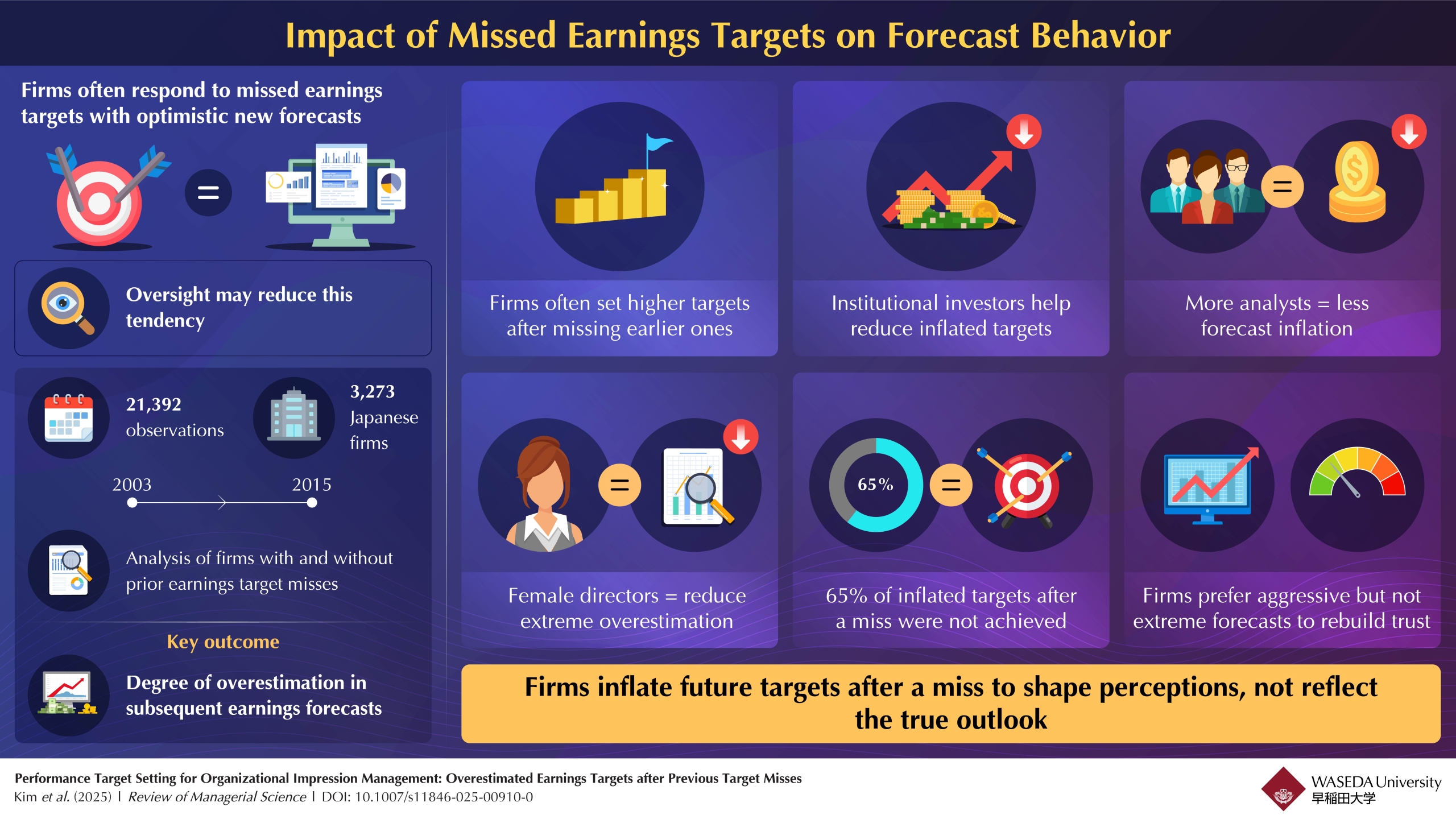Firms Raise the Bar After Missing the Target: Strategic Use of Overestimated Earnings Targets
Fri, Jun 27, 2025-
Tags
Firms Raise the Bar After Missing the Target: Strategic Use of Overestimated Earnings Targets
Researchers find that firms inflate future earnings targets after misses; 65% miss again, but stock prices still rise
A new study of over 3,000 Japanese firms reveals that companies often set overly ambitious earnings targets after previously missing their goals—an effort to restore investor confidence. This strategic move, known as “organizational impression management,” helps firms manage market perceptions despite the risk of repeated failure. The research also finds that institutional investors, analysts, and board diversity can temper this behavior, offering fresh insight into corporate communication and investor relations.

Image title: When Missing the Mark Means Raising It: How Firms Use Overestimated Earnings Targets
Image caption: After missing earnings goals, many firms set even higher targets to shift investor focus toward a brighter future, despite a 65% failure rate. This infographic shows how companies use overly ambitious forecasts as a strategic tool, and how institutional investors, analysts, and female directors help keep them in check. Based on a study of 3,273 Japanese firms by researchers from Japan and Korea.
Image credit: Professor Konari Uchida from Waseda University
License type: Original content
Usage restrictions: Cannot be reused without permission
When companies miss their earnings targets, one might expect them to lower expectations and rebuild investor trust slowly. However, many do the opposite. They announced even higher goals for the next period. A team of researchers, led by Professor Jungwon Min from Inha University, South Korea, including Professor Hyonok Kim from Tokyo Keizai University and Professor Konari Uchida from the Graduate School of Business and Finance, Waseda University, Japan, published a new study online in the journal Review of Managerial Science on June 03, 2025. It uncovers how firms strategically use these inflated projections to manage how stakeholders perceive them.
Analyzing data from 3,273 publicly listed Japanese firms over 12 years, the researchers found a consistent and deliberate pattern, i.e., companies that miss their earnings targets often respond by setting overly optimistic goals for the future. The study reveals that about 65% of these ambitious targets are missed, suggesting that many firms knowingly set difficult goals to achieve. Surprisingly, this tactic often pays off, at least in the short term. “Despite recent target misses, stock prices respond positively to these overestimated targets,” said Uchida.
The researchers explain that this behavior falls under what’s known as organizational impression management—a set of strategies companies use to shape how they are perceived, especially after failures. To test this behavior, the researchers used Japanese firms’ annual management forecasts—self-set earnings targets that companies are required to release. This regulatory feature provided a unique opportunity to study how companies adjust expectations immediately after reporting their actual results. The study revealed that overly optimistic targets tend to follow disappointing performance, suggesting a direct link between past failure and future promises.
But not all companies follow this pattern. The research also identified important moderating forces that help keep such overly ambitious goal-setting in check. Large institutional shareholders and analysts, who are often better equipped to detect patterns and demand accountability, can dampen a firm’s tendency to reach too far in its projections. Female directors, who tend to comply with rules and ethics, also restrain the release of overestimated targets. Their scrutiny helps prevent a cycle of repeated disappointments masked by future optimism. Still, when left unchecked, this pattern can have broader consequences. As more and more targets are missed, stakeholders start to catch on—and that can change how the market reacts.
“As target misses accumulate, investors may begin to recognize the pattern of biased estimates from firms with repeated earnings shortfalls,” Uchida noted. “This growing awareness can prompt negative reactions that help constrain firms’ myopic behavior.” In this way, the market can begin to correct itself, punishing firms that continue to inflate expectations and rewarding those with more grounded forecasts. Yet until that point, many firms benefit from the short-term gains of looking forward instead of back.
More fundamentally, the study challenges the assumption that performance goals are always data-driven or shaped by peer benchmarks. “We also find evidence that firms actively shape their performance targets rather than passively accepting those dictated by past performance or peer benchmarks,” said Uchida. In a landscape where perception drives value and narrative can outweigh numbers, this research offers a cautionary tale that optimistic forecasts may not always reflect business potential; they might just be damage control.
Reference
Authors: Hyonok Kim1, Jungwon Min2, and Konari Uchida3
Title of original paper: Performance target setting for organizational impression management: overestimated earnings targets after previous target misses
Journal: Review of Managerial Science
DOI: https://doi.org/10.1007/s11846-025-00910-0
Affiliations:
1Faculty of Business Administration, Tokyo Keizai University, Japan
2College of Business Administration, Inha University, South Korea
3Graduate School of Business and Finance, Waseda University, Japan
About Professor Konari Uchida
Dr. Konari Uchida is a Professor at the Waseda Business School specializing in corporate finance and governance. He received his Ph.D. in Economics from Kyushu University and previously held academic positions at the University of Kitakyushu and Kyushu University. He has also served as a visiting scholar at Stanford University, Arizona State University, and the University of Utah. Prof. Uchida has held leadership roles in major finance associations, including President of the Nippon Finance Association and Vice President of the Asian and Japan Finance Associations, and has served as Editor and Guest Editor for leading finance journals.














